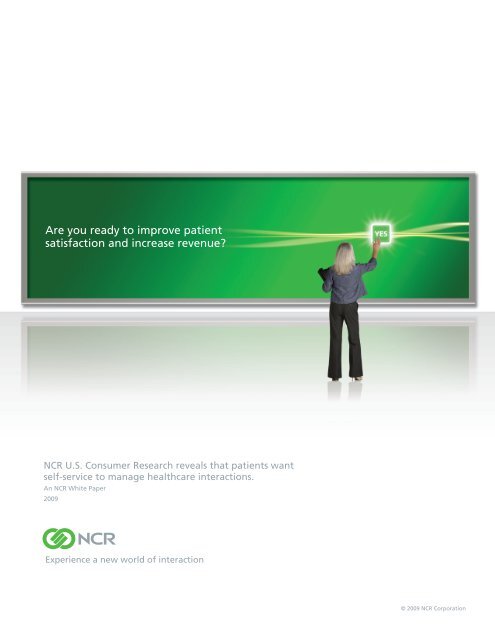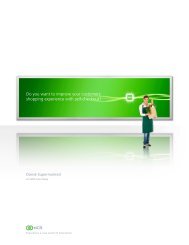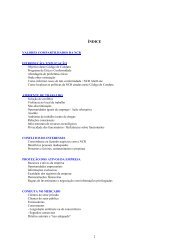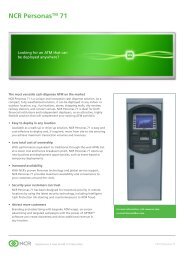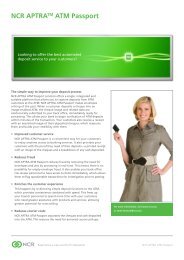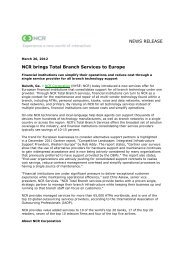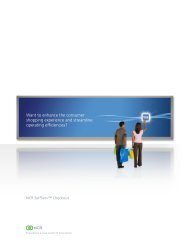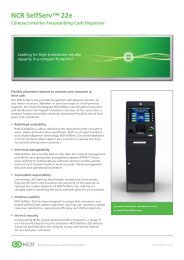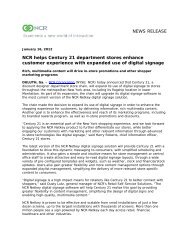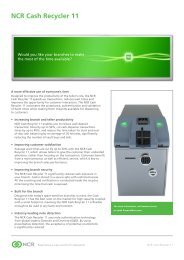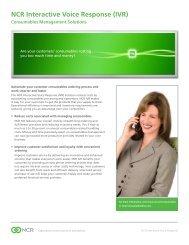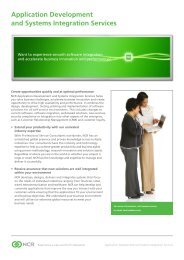Healthcare Self-Service Consumer Research, an NCR White Paper ...
Healthcare Self-Service Consumer Research, an NCR White Paper ...
Healthcare Self-Service Consumer Research, an NCR White Paper ...
You also want an ePaper? Increase the reach of your titles
YUMPU automatically turns print PDFs into web optimized ePapers that Google loves.
Are you ready to improve patient<br />
satisfaction <strong>an</strong>d increase revenue?<br />
<strong>NCR</strong> U.S. <strong>Consumer</strong> <strong>Research</strong> reveals that patients w<strong>an</strong>t<br />
self-service to m<strong>an</strong>age healthcare interactions.<br />
An <strong>NCR</strong> <strong>White</strong> <strong>Paper</strong><br />
2009<br />
Experience a new world of interaction<br />
© 2009 <strong>NCR</strong> Corporation
Patients frustrated with long waits 1<br />
New consumer research commissioned by <strong>NCR</strong><br />
Corporation reveals that patients are growing<br />
increasingly frustrated with long waits at physici<strong>an</strong>s’<br />
offices <strong>an</strong>d hospitals <strong>an</strong>d are looking to self-service<br />
technology as a way to help expedite these interactions.<br />
Hospitals <strong>an</strong>d clinics that leverage self-service via kiosks,<br />
online <strong>an</strong>d mobile applications to reduce the time <strong>an</strong>d<br />
effort required for patients to schedule appointments,<br />
pay medical bills <strong>an</strong>d complete registration forms<br />
will have <strong>an</strong> opportunity to drive loyalty <strong>an</strong>d increase<br />
patient volume in this competitive marketplace.<br />
As more patients participate in consumer-directed care<br />
pl<strong>an</strong>s, they are taking greater responsibility for their<br />
medical expenses <strong>an</strong>d overall health m<strong>an</strong>agement. This<br />
shift has empowered today’s healthcare consumers to<br />
exercise greater choice when selecting a healthcare<br />
provider. As a result, patients now seek the same<br />
level of convenience they have come to expect from<br />
retailers, hotels, b<strong>an</strong>ks <strong>an</strong>d airlines, <strong>an</strong>d that includes<br />
access to self-service tools. At the same time, healthcare<br />
providers face the dual challenges of rising costs <strong>an</strong>d<br />
declining reimbursement, requiring them to look for<br />
innovative ways to attract <strong>an</strong>d retain patients <strong>an</strong>d gain<br />
a competitive adv<strong>an</strong>tage.<br />
To help hospitals <strong>an</strong>d clinics better underst<strong>an</strong>d what<br />
patients w<strong>an</strong>t from their healthcare providers in this<br />
new era of consumer-directed care, <strong>NCR</strong> commissioned<br />
consumer research to provide insight into what motivates<br />
patients when determining where to seek care.<br />
Methodology:<br />
<strong>NCR</strong> commissioned BuzzBack<br />
<strong>Research</strong>, a leading international<br />
market research firm headquartered in<br />
New York City, to conduct this survey<br />
of 500 U.S. consumers.<br />
<strong>NCR</strong> Confidential Proprietary
Top line research highlights<br />
As the following top line data shows, the rise of<br />
consumerism in healthcare is impacting how patients<br />
choose their healthcare providers <strong>an</strong>d how they<br />
m<strong>an</strong>age their care.<br />
<strong>Healthcare</strong> trends <strong>an</strong>d preferences<br />
<strong>Consumer</strong>s were asked about their current frustrations<br />
with healthcare appointments, interactions with<br />
healthcare staff, reasons to choose one provider<br />
over <strong>an</strong>other, convenience of self-service options,<br />
expl<strong>an</strong>ations for missing a healthcare appointment <strong>an</strong>d<br />
interest in m<strong>an</strong>aging healthcare appointments via a<br />
kiosk or mobile device.<br />
<strong>Research</strong> findings<br />
Multi-ch<strong>an</strong>nel self-service solutions: 72 percent of<br />
consumers are more likely to choose a healthcare<br />
provider that offers the flexibility to interact via online,<br />
mobile <strong>an</strong>d kiosk self-service ch<strong>an</strong>nels over a provider<br />
that does not.<br />
Wait times lower satisfaction: 76 percent of consumers<br />
find waiting at a hospital or doctor’s office the greatest<br />
frustration they face at a healthcare appointment.<br />
Provider choice: All things being equal, 61 percent said<br />
they would choose one provider over <strong>an</strong>other based on<br />
the appointment scheduling process.<br />
Patient convenience:<br />
When it comes to convenience, patients w<strong>an</strong>t to spend<br />
less time on routine tasks like scheduling appointments,<br />
paying medical bills <strong>an</strong>d completing forms. A signific<strong>an</strong>t<br />
number are looking to conduct tr<strong>an</strong>sactions with their<br />
healthcare provider online or through a mobile device.<br />
• 62 percent of consumers expressed interest<br />
in booking or ch<strong>an</strong>ging medical appointments<br />
online, through a mobile device or at a kiosk<br />
<strong>an</strong>d receiving text message reminders of <strong>an</strong><br />
appointment.<br />
• 54 percent of consumers said the ability<br />
to book <strong>an</strong> appointment online would<br />
be convenient to them.<br />
• 31 percent of consumers said it would be<br />
convenient to be able to pay outst<strong>an</strong>ding<br />
bal<strong>an</strong>ces online or via a mobile device.<br />
2<br />
<strong>NCR</strong> Confidential Proprietary
Key insights<br />
The research findings provide insights into the opinions<br />
<strong>an</strong>d attitudes of patients, from which hospitals <strong>an</strong>d<br />
clinics c<strong>an</strong> develop <strong>an</strong>d implement strategies to increase<br />
patient satisfaction <strong>an</strong>d strengthen loyalty. The three<br />
key insights are:<br />
1. Fast. Providing online, mobile <strong>an</strong>d kiosk self-<br />
service options c<strong>an</strong> help healthcare providers meet<br />
growing patient dem<strong>an</strong>d for quick <strong>an</strong>d convenient<br />
interactions.<br />
2. Easy. Simplifying the process of scheduling<br />
appointments, paying bills <strong>an</strong>d completing forms<br />
increases patient satisfaction, drives revenue <strong>an</strong>d<br />
gives healthcare providers a competitive adv<strong>an</strong>tage.<br />
3. Tr<strong>an</strong>sformative. Integrating self-service solutions,<br />
via online, mobile <strong>an</strong>d kiosk ch<strong>an</strong>nels, is vital to<br />
attracting <strong>an</strong>d retaining patients.<br />
Booking <strong>an</strong><br />
appointment online<br />
Securely receiving<br />
lab results online<br />
Seeing <strong>an</strong>d m<strong>an</strong>aging personal health<br />
information on the internet<br />
Receiving a text message notification<br />
if <strong>an</strong> appointment becomes available<br />
at short notice<br />
Paying outst<strong>an</strong>ding bal<strong>an</strong>ces<br />
online or via a mobile phone<br />
Insight #1<br />
Which of the following would be convenient to use in<br />
m<strong>an</strong>aging your healthcare?<br />
32%<br />
31%<br />
43%<br />
Providing multi-ch<strong>an</strong>nel self-service solutions through the<br />
Internet, mobile devices <strong>an</strong>d kiosks allows hospitals <strong>an</strong>d clinics<br />
to meet growing patient dem<strong>an</strong>d for quick <strong>an</strong>d convenient<br />
interactions with healthcare providers.<br />
The data shows that patients w<strong>an</strong>t to interact with providers<br />
in a way that is most convenient for them, whether booking<br />
<strong>an</strong> appointment online or receiving a text message on a<br />
mobile device when <strong>an</strong> appointment becomes available at<br />
short notice. The research also illustrates that patients are<br />
interested in utilizing the Internet, mobile devices <strong>an</strong>d kiosks<br />
to m<strong>an</strong>age a variety of tr<strong>an</strong>sactions, including lab results<br />
delivery <strong>an</strong>d bill payment.<br />
54%<br />
54%<br />
3<br />
Patients are most interested<br />
in booking appointments <strong>an</strong>d<br />
receiving lab results online.<br />
<strong>NCR</strong> Confidential Proprietary
Insight #2<br />
By making it easier for patients to schedule <strong>an</strong>d check<br />
in for appointments, pay bills <strong>an</strong>d complete medical<br />
forms, healthcare providers have <strong>an</strong> opportunity<br />
to increase patient satisfaction, improve revenue<br />
<strong>an</strong>d attain a competitive adv<strong>an</strong>tage in the local<br />
marketplace.<br />
The research reveals that patients are most frustrated<br />
by the long wait times they encounter at hospitals<br />
<strong>an</strong>d physici<strong>an</strong> offices. In addition, they are<br />
inconvenienced by the time <strong>an</strong>d effort required<br />
to m<strong>an</strong>age everyday interactions, like scheduling<br />
appointments <strong>an</strong>d paying outst<strong>an</strong>ding bal<strong>an</strong>ces, <strong>an</strong>d<br />
would like to spend less time on these activities. By<br />
offering multi-ch<strong>an</strong>nel self-service solutions, healthcare<br />
org<strong>an</strong>izations c<strong>an</strong> improve patient flow <strong>an</strong>d revenue<br />
cycle m<strong>an</strong>agement by expediting routine healthcare<br />
processes like collecting bal<strong>an</strong>ces <strong>an</strong>d co-pays.<br />
Waiting at a doctor’s<br />
office or hospital<br />
Re-entry of personal data<br />
or health history<br />
Insur<strong>an</strong>ce authorization<br />
requirements<br />
Completing <strong>an</strong>d signing<br />
paper forms<br />
Queuing to speak with<br />
a staff member<br />
None of the above.<br />
Which of the following occurrences at a healthcare appointment<br />
do you find frustrating?<br />
10%<br />
31%<br />
40%<br />
54%<br />
50%<br />
Seventy-six percent of respondents<br />
find waiting at a hospital or doctor’s<br />
76%<br />
office the greatest frustration at a<br />
healthcare appointment.<br />
4<br />
<strong>NCR</strong> Confidential Proprietary
Insight #3<br />
Integrating self-service solutions via online, mobile<br />
<strong>an</strong>d kiosk ch<strong>an</strong>nels is vital to attracting patients <strong>an</strong>d<br />
provides a key point of differentiation for hospitals <strong>an</strong>d<br />
clinics.<br />
In fact, a majority of patients w<strong>an</strong>t self-service solutions<br />
<strong>an</strong>d will choose the healthcare provider that offers<br />
these solutions over one that does not. As patients<br />
are empowered with greater responsibility when it<br />
comes to their choice of care provider, this finding<br />
underscores the import<strong>an</strong>ce of deploying self-service as<br />
a business strategy to help create a consistent, seamless<br />
patient experience at every step of the care process.<br />
By providing a positive patient experience, healthcare<br />
providers c<strong>an</strong> build loyalty among existing patients<br />
while attracting new ones, resulting in increased<br />
patient volume.<br />
How likely are you to choose a healthcare provider that offers you the<br />
flexibility to interact easily via online, mobile <strong>an</strong>d kiosk self-service<br />
ch<strong>an</strong>nels versus a provider that doesn’t?<br />
17%<br />
11%<br />
55%<br />
17%<br />
72%<br />
Much less likely<br />
Somewhat less likely<br />
Somewhat more likely<br />
Much more likely<br />
Seventy-two percent of<br />
respondents are more likely<br />
to use healthcare providers<br />
that offer self-service.<br />
5<br />
<strong>NCR</strong> Confidential Proprietary
Conclusion<br />
The steady rise in the number of patients enrolled in<br />
consumer-directed care pl<strong>an</strong>s makes it increasingly<br />
import<strong>an</strong>t for hospitals <strong>an</strong>d clinics to effectively<br />
compete in the local marketplace. While a patient’s<br />
choice of healthcare provider was once determined by<br />
geography, today’s patients have greater choice – <strong>an</strong>d<br />
they are choosing to stay loyal to those healthcare<br />
providers that provide the best overall patient<br />
experience.<br />
The research supports the case that utilizing self-<br />
service technology to enh<strong>an</strong>ce the patient experience is<br />
becoming <strong>an</strong> imperative to drive customer preference<br />
<strong>an</strong>d loyalty. Data clearly indicates that patients are<br />
frustrated by the time <strong>an</strong>d effort required to m<strong>an</strong>age<br />
routine interactions, such as scheduling appointments,<br />
paying bills <strong>an</strong>d completing paperwork, <strong>an</strong>d they w<strong>an</strong>t<br />
to spend less time on these tasks. The research also<br />
reveals that patients w<strong>an</strong>t better access to information<br />
about their care.<br />
Automating patient interactions not only addresses<br />
consumer dem<strong>an</strong>d, it also serves as the entry point for<br />
electronic record keeping – a key initiative underway at<br />
healthcare org<strong>an</strong>izations nationwide. As more hospitals<br />
<strong>an</strong>d clinics move to implement electronic health<br />
records, the benefits of self-service become even more<br />
widespread.<br />
To find out more about how you c<strong>an</strong> integrate self-<br />
service into your facility, contact your local <strong>NCR</strong> sales<br />
representative today.<br />
6<br />
<strong>NCR</strong> Confidential Proprietary
Why <strong>NCR</strong>?<br />
With over 125 years of experience, <strong>NCR</strong> is a leading global<br />
provider of assisted- <strong>an</strong>d self-service solutions. We help our<br />
healthcare clients around the world improve their patient<br />
interactions, implement ch<strong>an</strong>ge quickly <strong>an</strong>d proactively, <strong>an</strong>d<br />
tr<strong>an</strong>sform their org<strong>an</strong>izations to become leaders <strong>an</strong>d ch<strong>an</strong>ge<br />
agents. We c<strong>an</strong> help you, too.<br />
<strong>NCR</strong> Corporation<br />
1700 S. Patterson Blvd<br />
Dayton, Ohio 45479<br />
USA<br />
For more information visit:<br />
www.ncr.com/healthcare<br />
Experience a new world of interaction<br />
<strong>NCR</strong> continually improves products as new technologies <strong>an</strong>d components become available. <strong>NCR</strong>, therefore, reserves the right to ch<strong>an</strong>ge specifications without prior notice.<br />
All features, functions <strong>an</strong>d operations described herein may not be marketed by <strong>NCR</strong> in all parts of the world. Consult your <strong>NCR</strong> representative or <strong>NCR</strong> office for the latest information.<br />
All br<strong>an</strong>d <strong>an</strong>d product names appearing in this document are trademarks, registered trademarks or service marks of their respective holders.<br />
© 2009 <strong>NCR</strong> Corporation Patents Pending EB10137-0409 www.ncr.com


